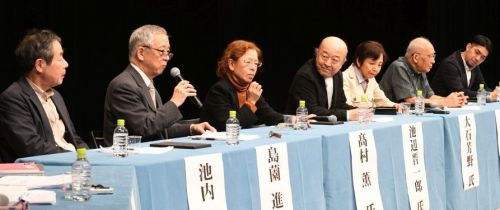Committee of Seven symposium addresses need to share Okinawa’s voice, apathy by mainland Japanese toward Okinawa

(From left) Satoru Ikeuchi, Susumu Shimazono, Kaoru Takamura, Shinichiro Ikebe, Yoshino Oishi, Michiji Konuma, and Jinshiro Motoyama speaking at the symposium titled “Questioning this nation from Okinawa” on November 21 at the Ryukyu Shimpo Hall in Izumizaki, Naha
November 22, 2019 Ryukyu Shimpo
On the evening of November 21, a symposium titled “Questioning this nation from Okinawa–peace, the Constitution, and democracy” (sponsored by the Committee of Seven to Appeal for World Peace, co-sponsored by the Ryukyu Shimpo) for investigating the nature of peace was held at the Ryukyu Shimpo Hall in Naha. At the symposium, speakers discussed the opposition of many Okinawans to the new base construction in Henoko, Nago in conjunction with the relocation of U.S. Marine Corps Air Station Futenma and criticized the Japanese government for pushing forward with the construction and running counter to peace-making efforts. The hall was packed with 400 attendees, who listened with rapt attention to the speakers’ words.
Regarding the fact that Okinawa’s base issues are not regarded as national issues, Naoki Prize-winner Kaoru Takamura pointed out that “apathy toward and ignorance about Okinawa, and ignorance of history, pose a major barrier.” University of Tokyo emeritus professor of religious studies Susumu Shimazono said, “forgetting of history and cessation of thought prevent an understanding of Okinawans’ pain and suffering.”
Jinshiro Motoyama, who was representative of the association that worked to bring about the prefectural referendum regarding the Henoko base, said, “The result of the prefectural referendum was trampled upon. Is Japan really a country that values its peace constitution and democracy?” Nagoya University emeritus professor of astrophysics Satoru Ikeuchi said, “The Japanese government alleges to be future-minded, but it has no sense of accountability. We must continue holding it accountable.”
Regarding what Okinawans should do going forward, composer and cultural icon Shinichiro Ikebe called for continued activism, saying, “Things will change eventually. If we keep making efforts and don’t give up, our strength will grow.” Keio University emeritus professor of physics and director of the Committee of Seven Michiji Konuma said, “Looking globally, bases are decreasing continuously.”
Photographer Yoshino Oishi emphasized, “Interacting with the people protesting at Henoko, I felt that continuing such activism is important. If we stop, we would be playing into the hands of the people who want to make war.”
The symposium closed with a chorus of the peace song “Kowashite wa ikenai (we must not break it)” led by Ikebe. Some of the committee members observed the protests in front of the gate to U.S. Military Camp Schwab in Henoko, Nago on the morning of the same day.
(English translation by T&CT and Sandi Aritza)
Previous Article:The Nirai Kanainu-kai organization is formed to demand the return of over 219 Okinawan remains taken from Okinawa
Next Article:Naha Airport’s second runway to open next year
[Similar Articles]
- German peace organization offers cooperation to “make Henoko a global effort”
- Newly launched Okinawa research society to be advised by former Prime Minister Hatoyama
- Okinawa Prefecture hosts online symposium regarding the military base issue in Okinawa, attended by the governor and prefectural staff
- Awamori promoted for registration in the World’s Cultural Heritage list
- Ex-governor Ota nominated for Nobel Peace Prize
 Webcam(Kokusai Street)
Webcam(Kokusai Street)


